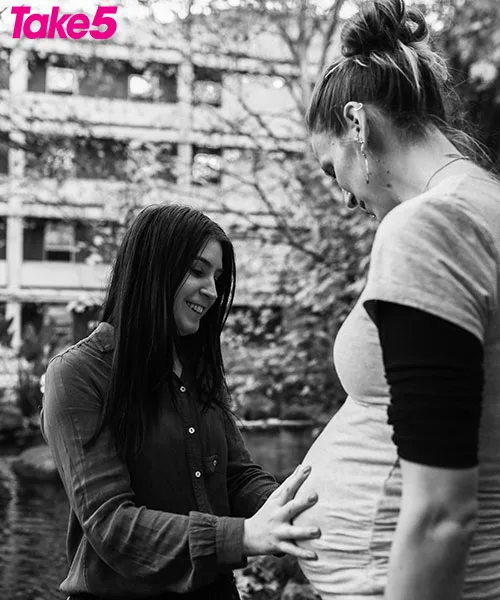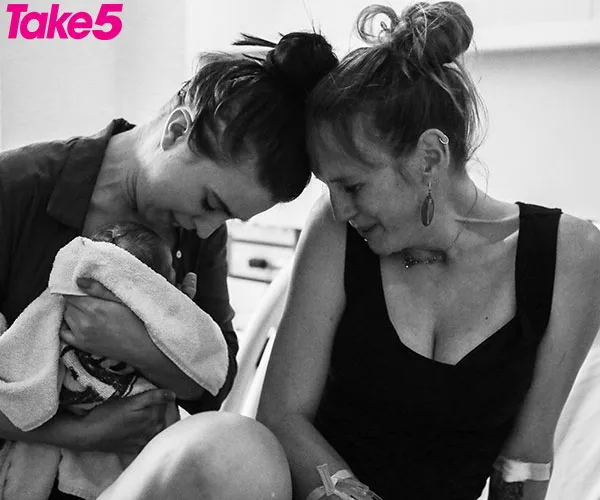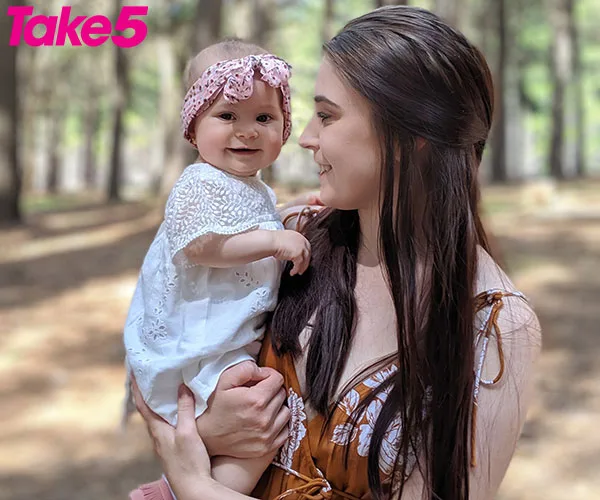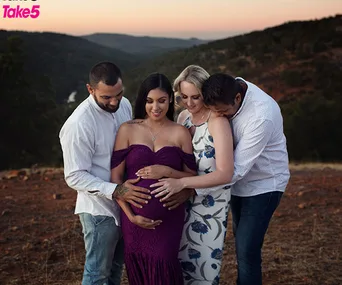Hannah Smith, 32, Adelaide Hills, SA shares her surrogate birth story:
My body shook as the doctor’s name flashed across my phone screen.
It was Christmas Eve, and I knew they wouldn’t be calling unless something was terribly wrong.
Not ready to hear the results, I handed the phone to my mum, Julie.
“You take it,” I stammered.
A few days earlier, I’d gone to a fertility specialist for tests to find out why, at 21 years old, I’d never had a period.
Previous blood tests hadn’t revealed any abnormalities in my hormones and my sister was a late bloomer so for years doctors told me to be patient.
But I felt something was amiss. The specialists had run an MRI to narrow things down.
Mum listened carefully before bringing the phone down by her side.
“Tests showed you don’t have a uterus,” she said softly.
I was devastated.
With dreams of studying midwifery at uni, it was a shock to discover I wouldn’t be able to have children naturally.
After Christmas, I talked to the specialist about my condition.
“You have Mayer-Rokitansky-Küster-Hauser syndrome, or MRKH,” he said, explaining that sufferers fail to have normal ovaries and fallopian tubes
Although I couldn’t carry children myself, there were other options like surrogacy and adoption. I’d always dreamed of becoming a mum naturally so it was a hard pill to swallow.
A month later, I was accepted into uni for midwifery. With my diagnosis still raw, it was bittersweet.
Would I cope helping others give birth knowing I couldn’t have children myself?
A few months later, my cousin Lee visited us. Over a cuppa with Mum, she put her hand on mine.
“When you decide you want kids, I’d be happy to be your surrogate,” she told me.
We all burst into tears. It was such a selfless act!
Years later, my 30th birthday was coming up and I was an experienced midwife. I knew it was time to freeze my eggs if I ever wanted a child of my own.

I’ll be forever grateful for what Lee did for me.
(Image: Supplied)But when I did the blood test to prepare, it showed that the hormone in charge of releasing my eggs was extremely low, meaning I had the same amount of eggs as a 40-year-old.
I started on the egg retrieval hormones a week later and two weeks after that, headed back to the doctor so my eggs could be collected.
Back in the waiting room, one lady talked to me about freezing embryos instead of my eggs.
I knew the rates of successful embryos were much higher than eggs that needed to be defrosted then fertilised.
“I don’t even have a partner yet,” I laughed.
“You don’t need one,” she replied with a smile. “You could use a donor.”
I’d never considered that before, but the woman was right.
Before I could go through with it, I had to ask Lee.
It’d been eight years since she’d offered to be my surrogate, and with three kids of her own, it was a lot to ask.

Me and Lee after the birth of my daughter.
(Image: Supplied)“Of course,” she said. “A promise is a promise.”
I’d always known she was incredibly kind, but this was going above and beyond!
Shortly after, we used donor sperm to freeze embryos.
After dealing with the legal side of surrogacy, we started the implantation process.
The first transfer wasn’t successful but we kept trying.
Two weeks after the second transfer, I sat at my computer eagerly awaiting Lee’s blood test results.
I refreshed the page and burst into tears. Lee was pregnant!
We kept it a secret until the anniversary of my diagnosis.
At Christmas, I told my parents and Lee told her kids. Our families were thrilled for us.
Six-and-a-half months later, Lee was induced.
Although I couldn’t carry my own child, as a midwife, I could help Lee deliver it.
We even hired a photographer to capture the special moment.

I love being a mum to Imara.
(Image: Supplied)Eventually, my baby girl, Imara Lee, was in my hands.
I lay down next to Lee as we shared this moment of pure joy together before we cut the cord.
Five hours later, we were allowed to leave. Lee wanted to head home to her kids and I was keen to spend time with my baby girl.
Thankfully Lee gave me plenty of frozen breastmilk to feed Imara.
As I strapped her into my car for the 40-minute drive home, my heart pounded with fear.
My bub was so tiny and fragile, all I wanted to do was hold her. When we got home, I couldn’t help but stare at her.
She was perfect.
Incredibly, for five months, Lee pumped breastmilk for me and I induced my own lactation by taking hormones and medication that allowed me to breastfeed her too.
Feeling Imara latch on for the first time was incredible.
“I’m so happy you’re finally here,” I told her.
One day she’d know just what Lee and I went through to bring her into the world.
Motherhood hasn’t always been easy, but with Immy in my arms, it’s all worth it.
I’m so grateful for Lee and all she did to help me become a mum.
I’ve even decorated a wall with photos of her pregnancy and Immy’s birth so my girl knows the love it took for her to be here.
Although I’m not physically able to carry a child, I know I was born to be a mother.
Hannah is now trying to give Imara a sibling. You can support her by visiting her GoFundMe Page.


